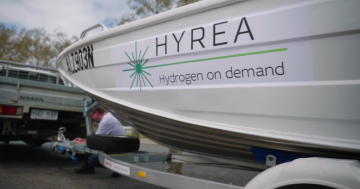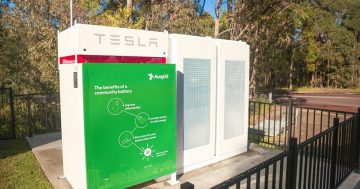
Team Zuko (bottom centre, comprised of Ophelia Phraphone, Rui Hang Yong, Laura Cimilio and Ollie Viant won this year’s hackathon. Photo: supplied.
Two Canberra teams took out second and third place at this year’s Zero CO2 Renewable Energy and Sustainability Hackathon, where teams are challenged to come up with potential solutions to help the ACT achieve its net-zero carbon emissions target by 2045.
First place was taken out by Team Zuko with a moss panel system combining green walls and solar panels that reduce carbon and creates electricity.
The louvre window panel can be adapted into a portable, free-standing structure to use in homes and offices to help air quality and climate control.
Canberra-based teams Rexergy and OneStopSolar came second and third respectively.
Rexergy developed a small device that changes colour depending on whether it is a good or bad time to use energy – glowing green when you are using solar energy and red when fossil fuels are being used.
OneStopSolar created a prototype website that allows people to calculate the solar panel size and battery system that would best suit their home or office. It then provides a list of local providers and can even predict the optimal operating specs for your energy systems.
The Zero CO2 Renewable Energy and Sustainability Hackathon was organised by the Canberra Institute of Technology, the Canberra Innovation Network, Neoen and ActewAGL and hosted 18 teams and 71 participants from across Australia. Twenty teams from Indian institution partner Saintgits also expressed interest in the event.
CEO of the Canberra Innovation Network Petr Adamek said the event allows for collaborative and unique solutions that can help the world move towards cleaner, renewable energy.
“We get teams made up of researchers to entrepreneurs, engineers to students, all benefiting from this vibrant environment where their projects and innovations foster into real viable innovation-based businesses,” he said.
“We are super excited to be collaborating on two more events this year as well!”
Teams competed for a prize pool of $10,000 and were put through two weeks’ worth of intensive workshops before pitching their idea.
The ACT transitioned to 100 per cent renewable energy at the end of last year.





















